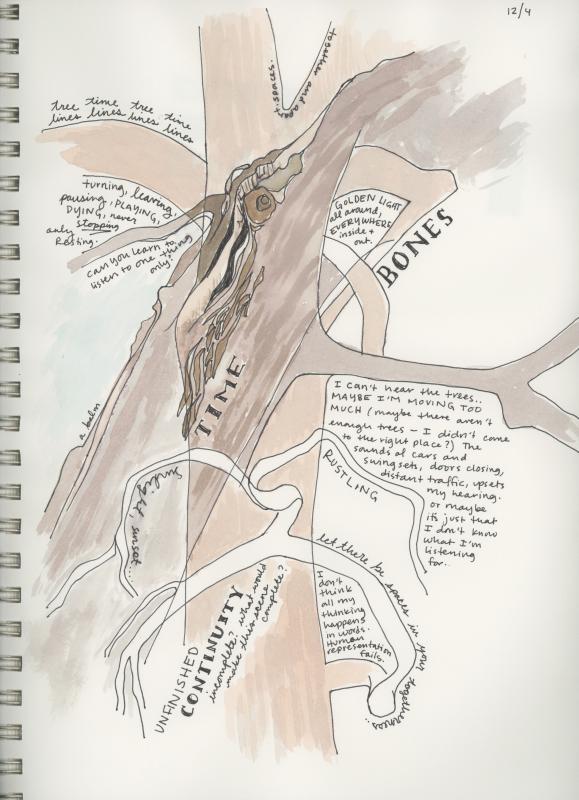Serendip is an independent site partnering with faculty at multiple colleges and universities around the world. Happy exploring!
Towards Day 26 (Mon, Dec.10): Ecology without Nature (?)


weather prediction: 56 degrees, 12 mph winds, 10% chance of precipitation, fog
srucara's site-ing us inside
I. coursekeeping
--map of the area, showing Mill Creek
--sign up in your groups for Wednesday's "teach-in" (so we can figure out the timing; also whether we can do the course evals then--or need to do 'em today....)
--questions about checklist, portfolio, other final obligations?
--don't forget to e-mail me, to schedule your final writing conference
II. what emerged from your final set of "site sits"
smacholdt--sound (and smell!) scape!
rachel--more "open" poem
graham--human encroachment fully present...just putting aside a beautiful and ideal spot demonstrating “nature”
srucara--moving from woundedness, through loneliness, to find the ocean w/in...
eetong--wonderful sketch of intersectionality
ekthorp--reflecting on semester/anticipating future (duller, muted, chaos created by the geese...)
sarahj--"reading into" the upkeep of the grounds/neglect of Perry House
(hira, mturer, sara?)
III. your reflections about our two excursions last week:
rachelr: upsetting trash…very much together….able to sense the community…
speed at was slow…a different, removed time and space….
(later): cf'ing auditory description and visual perception: "had I closed my eyes at Ashbridge,
perhaps I would have experienced ...my own placement within a larger context. Which is,
I suppose, what this semester has been all about.
sarahj: accidental theme of sound
smacholdt(@ ashbridge): self-directed, still, listening…and poetry!
(w/ carmen): teamwork is a very underrated way of going about things
mturer: pastoral reflections shadowed by the real, ecological concerns of litter
and irresponsible human behavior….focus on our class as a single entity
froggies315: "just letting it gel"
eetong: When do we need a guide? When do we guide ourselves?
wanted more preparation/connections @ Ashbridge...
--and wrote a poem about the "many-textured terrain" of the blind field shuttle
graham: The experimental experience of having our vision taken away from us...provided us with ...methods of reliance and trust....Both field trips...turned us into teachers ourselves allowing us to interpret whatever information we picked up in experimental ways and learn from that with a more personal intimacy.
(hira, sara, ekthorp, srucara?)
cf. dinner with Carman Papalia: his focus less on trust than on
sharing his own non-visual experience w/ others
cf. John Muse (Postdoctoral Fellow in Visual Studies @ HC):
focus on our need for one another ("what can a body do?"--w/ the help of others?)
cf. also interesting discussion about how to 'document' processual art in a gallery....
IV. Timothy Morton's Introduction to Ecology Without Nature
count off to get yourself a new conversation partner
with her, work your way through 1-2 paragraphs/pages of Morton's essay,
looking for answers to these questions:
1. (paras 1-2): What is the "basic message" of env'l criticism?
What are "properly ecological forms" of art?
(cf. p. 2: what's a "proper" relationship with the earth?)
2. (pp. 4-5): What's wrong w/ understanding nature as a "surrounding medium,"
or "admiring it from afar"? (What's the relation between those 2 acts?)
What's wrong w/ "particularism"?
What is the "wider view" of env'l art and criticism that this book advocates?
3. (pp. 6-7): What "ideas of nature" hold us back from meaningful engagements w/ nature?
"What, in essence, is nature all about"?
4. (pp. 10-11): What are ecology's "ideological determinants"?
What's wrong with nature writing as "a re-enchantment of the world"?
How does an "aesthetic" become an "anesthetic"?
What is the book's cri de guerre?
What role do localist poetics and retroactive fantasies of place play in our world view?
5. (pp. 12-13): What is a "truly theoretical" approach?
What is the "only ethical" option? What is "deconstruction"
(and how is it similar to queer theory?!) What role does
"nonidentity" play here?
How do we (collectively) understand these claims?
What does it mean to say that something is "natural"? That it is "unnatural"? (p. 14)
"When I suggest that we drop the concept of nature, I am saying that we really drop it....
'Ecology without nature' is a relentless questioning of essence (p. 21).
"Environmental writing is a way of registering the feeling of being surrounded by...an otherness,
something that is not the self....(p. 17)...what precisely is it if it is not "around" anything?...If,
at bottom, there is no problem...if...we coexist in an infinite web of mutual interdependence
where there is no boundary or center...? (p. 23)
'Ecology without nature' could mean 'ecology without a concept of the natural'....
Thinking, when it becomes ideological, tends to fixate on concepts rather than doing
what is 'natural' to thought, namely, dissolving whatever has taken form. Ecological thinking
that was not fixated, that did not stop at a particualr concretization of its object,
would thus be 'without nature' (24).
What does it mean to "really drop" the concept of nature?
What is "natural"?
What does "ecology without nature" mean?
What does it mean to be "without nature"?
What is "ecological thinking," in Morton's book?
What is the "environment" if it is not what "surrounds" us/is "around" us?


